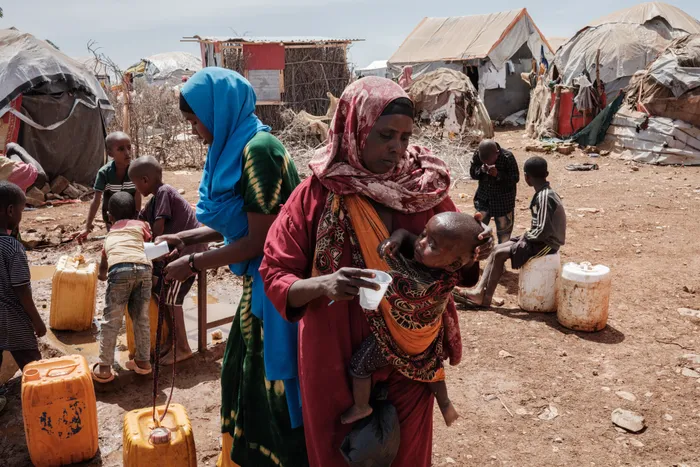Conflict, climate change wreaking havoc on millions

Picture: Yasuyoshi Chiba/AFP - A woman gives water to her child at a camp for internally displaced people in Baidoa, Somalia, earlier this year. The country is experiencing the worst hunger crisis in living memory. One person is likely to die of hunger every 36 seconds between now and the end of the year in drought-stricken east Africa, says the writer.
By Gail Smith
The Covid-19 pandemic has exacerbated extreme inequality in the south and east African countries, and has pushed millions of people into abject poverty. As many as 35.5million people in SADC countries lost their jobs in 2020 due to the pandemic, down by 26% from 2019 employment numbers, while the 15 SADC member states lost about $80billion in 2020 due to lower-than-expected growth.
The pandemic and its economic aftershocks have worsened food and nutrition insecurity in the SADC region, catalysing an urgent need for concerted efforts in the region to build resilience to address the multiple and increasing shocks it faces.
The number of food-insecure people in the SADC region is estimated to be 55.7 million, while almost 18.6 million children are stunted, representing a third of stunted children in Africa.
The prevalence of anaemia (iron deficiency) in women of reproductive age in the region is at levels of public health concern, while the prevalence of overweight children in upper-middle economies in the region is considered “high”.
One person is likely to die of hunger every 36 seconds between now and the end of the year in drought-stricken east Africa as the worst-hit areas hurtle towards famine. The situation in Somalia, Ethiopia and Kenya is deteriorating fast. Somalia is experiencing the worst hunger crisis in living memory, with the number of people experiencing acute hunger already surpassing that of the famine of 2011, when more than a quarter of a million people died.
Almost one in six people in Somalia are now facing extreme hunger. Large parts of the region have suffered four failed rainy seasons – with a fifth likely to unfold over the next three months – as climate change has decimated crops and forced pastoralists to abandon their traditional way of life. The crisis has been exacerbated in many places by conflict, the fallout from Covid-19 and by rising food prices due in part to the war in Ukraine.
High and pervasive levels of poverty in the region continue to be reinforced by low economic growth rates, high levels of unemployment, rising inequality, increasing frequency and intensity of global economic shocks on African economies, weak social protection systems and the poor provision of basic services including health, water, hygiene and sanitation.
Furthermore, the effects of climate change also pose irreversible effects on sustainable livelihoods and food security in the SADC region. The current crisis of hunger arises from the complex interaction between historical and current structural issues, as well as the recent pandemic-related economic shocks experienced in the SADC region. Addressing the acute and chronic aspects of food and nutrition insecurity are not entirely insurmountable.
Oxfam South Africa believes in strengthening safety nets as well as broader social protection systems that support more resilient livelihoods. We believe the crisis can be managed by expanding high-impact nutrition interventions that target children under the age of five, adolescent girls and women of reproductive age, to accelerate stunting reduction in the region, and improve women and girls’ access to nutritious food, education and services.
It is also important that they participate in decision-making processes on issues that affect their lives. The climate crisis is no longer a ticking bomb – it is exploding in front of our eyes. We are skating on thin ice and it’s still getting warmer.
Extreme weather has caused tremendous damage and pushed millions of people to the brink. Today 48 million people in 10 of the world’s worst climate hotspots are going hungry – that is more than double the figure in 2016. We are past the boiling point. Unless we act immediately, millions more of already poor people will not afford their next meal. There will be irreversible damage.
At the heart of the climate crisis is a horror story of injustice and exploitation. Leaders of rich polluting nations continue to allow fossil fuel companies to amass an average of $2.8 billion a day of profit as they watch the world burn, while the poorest countries least responsible for the climate crisis are hit hardest. How many more disasters does it take before we stop wreaking havoc on our planet? How many more people should die from hunger before rich polluting nations start taking decisive action? The future does not have to be bleak.
We can still prevent further disasters if we act together and act decisively now. We can save lives if we act now. To combat climate change, we need policy change. We need political courage. All the stark warning signs of a full-scale catastrophe are there. We know what has worked: cutting emissions, acting early on disaster warnings, investing in social protection, and investing in agriculture to help farmers adapt and cope with climate shocks. We are failing because of the lack of political courage.
Smith is Head of Media and Communications at Oxfam South Africa.